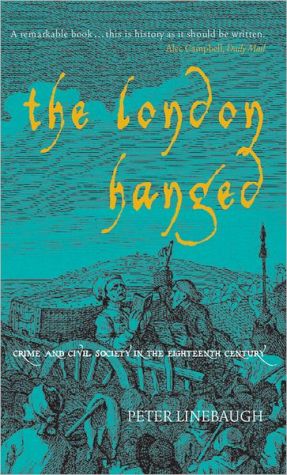

 |

|

The average rating for The London Hanged based on 2 reviews is 4.5 stars.
Review # 1 was written on 2011-04-27 00:00:00 Scott Silvia Scott SilviaBefore there was a wage economy, people kept themselves alive through a variety of means; wages were small and often irregularly paid, and the gap between starvation and survival was filled partly through customary perquisites, more flexible than wages and more responsive to changing conditions. If you cut patterns for a tailor, you could keep (for use or sale) the scraps of material left over; if you worked in a shipyard, you could keep scraps of leftover lumber and rope; if you were a weaver, you kept the trimmings when a piece of cloth was cut from the loom; if you carried hogsheads of sugar or tobacco on the docks, you kept the sweepings and the spillage. As part of the rationalisation of economic and industrial structures, employers and the governing class sought to do away with such customary perquisites and replace them with a more rigid and controllable basis for economic relations (i.e. wages), the level of which can be fixed and decided from above: "Customary appropriations appear as inefficiency or waste to the technologist, as an inventory loss or transaction cost to the economists, and a depredation or crime to the police" (430). Thus customs that had prevailed for centuries were designated as crimes and the newly invented crimes ruthlessly punished as part of a theatre of power. This shift, and resistance to it, is part of a larger move to criminalise poverty and reorganise class relations and property structures. In the course of tracing the stages of this struggle in early modern London, Linebaugh gives fascinating glimpses into the lives of working people. |
Review # 2 was written on 2017-08-02 00:00:00 Svein Olnes Svein OlnesPeter Linebaugh explores the links between Capital Punishment and the rise of wage labour and a form of global capitalism in the 18th Century with this magisterial book. Let me be frank, this is not an easy read, and provided you can sit through the academic prose, you will find this book to be a treasure trove of nuggets of great information. As someone who studied criminal law to a Masters level, this history of crime (although it is arguable if the book is this) was one that had me riveted from start to finish. Linebaugh starts with the rise of finance capitalism in 1690 onwards. The start of the 18th Century also saw the rise of Capital Punishment being doled out for crimes against property. Thus was born the edifice of State Terror (that Linebaugh calls the Thanatocracy) that symbolised the awesome power of the sovereign. The hanging tree, or gibbet scaffold was a place that was designed to instill terrors in to the hearts of those who would break the laws of the sovereign, and in the aftermath of the Restoration, this meant the King. Linebaugh exposes how the bulk of the London Hanged were apprentices, especially within trades such as food and drink, weaving and tailoring. These apprentices were drawn into London by the rise of wage labour, but with the rise of Wealth (and thus creation of Poverty), they were easily immiserated. As the customary forms of remuneration (such as 'chips' of wood for shipbuilders) were lost, the plight of the poor became more and more untenable, and with it rose 'crime'. Indeed, the bulk of the hanged were hanged for crimes against property, designed to alleviate the poverty being wrought by enclosure and factory. Sadly, women play a peripheral role in Linebaugh's tome, but they are present on the margins, their voices softly sighing through the pages. What is evident, throughout this book, is how the notion of crime went from detection to prevention, and how customary rights to part of the fruits of labour were replaced with notions of 'moral fortitude' and payment in lieu. Linebaugh presents a wonderful history of the roles of Patrick Colquhoun (the father of police), and the Bentham brothers' roles in seeking to create the primacy of the wage (or in Marxist terms, the alienation of labourer from product). Overall, this is a great and well researched piece of history, showing how migration to the City, colonial repression, the ideology of the "free market" and the moral sensibilities of the propertied classes combined to provide technical, economic and legal/moralistic arguments to ensure that as the forces of Capitalism extended their tentacles, those tentacles were placed firmly around the necks of the working classes. |
CAN'T FIND WHAT YOU'RE LOOKING FOR? CLICK HERE!!!